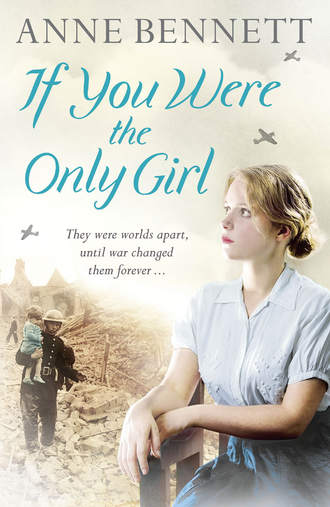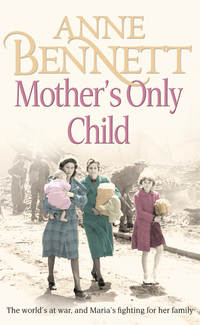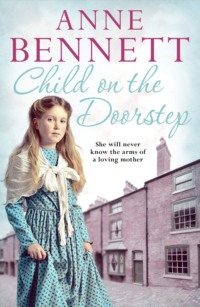
Полная версия
If You Were the Only Girl
‘You’re not kidding,’ Evie said with an impish grin, and Clodagh lobbed a pillow at her, though they muffled their giggles in case they were overheard.
Lucy lay awake long after her friends. She knew that Clive would go because she had seen the resolve on his face, and part of her was proud that he was prepared to fight for something he saw as right, but a far greater part of her was worried for his safety. When sleep eventually claimed her, she was beset by horrific nightmares.
Clive left, then sent a letter to his parents saying that he had arrived safely and met up with his friends. There was nothing else, and as one week followed another with no further news, Mr Carlisle said he wasn’t surprised.
‘Master Clive will not be in any sort of regular army,’ he said, ‘so he probably will be unable to contact anyone here, and even if he did manage to get the odd letter home, it’s highly unlikely that they would be any sort of address on it to enable his parents to write back.’
Lucy hadn’t thought of that, and she felt even more sorry for Lord and Lady Heatherington. She herself already missed Clive with a pain she could barely understand and, anyway, could never confess to.
‘They must be worried sick,’ she said one night as she undressed for bed.
‘Yes,’ Evie said. ‘You know, the Mistress asked Norah yesterday if she had ever heard the expression that the silence can be deafening and when Norah said she hadn’t the Mistress said that she’d not understood what it meant until now.’
‘Ah,’ Lucy said, ‘it is sad, isn’t it? And I think the only thing we can do is keep our heads down, and hope and pray that this business in Spain won’t go on too long, and that Clive will be coming home again soon.’
Lord Heatherington wanted to find out as much as he could about the conflict in Spain, so he ordered more English papers and began to listen to the wireless news intently. In early October, he read the accounts of Oswald Mosley’s attempt to lead his party, the British Union of Fascists, in a march through the East End of London, where a lot of Jews had their homes and businesses.
Lord Heatherington could hardly believe what he was reading. ‘What is it, my dear?’ Lady Hetherington asked, noticing his agitation. ‘What’s upset you so?’
‘It’s Mosley’
‘Oswald Mosley?’ They had met the man many times when they had lived in England. ‘What’s he done?’
‘His damned party – the British Union of Fascists or some such rubbish they’re called – tried to march through the East End of London where a great many Jews live, apparently. Good God, Clive didn’t have to go so far to fight fascists; we have them on our own doorstep.’ He shook his head, bewildered. ‘I didn’t imagine for a moment that British people would get caught up in this racial hatred. To think, I have sat at the same table and had a drink with that man.’
‘But what happened?’ Lady Heatherington asked. ‘You said, “tried to march”. You mean they didn’t succeed?’
‘No, Mosley didn’t succeed, for the simple reason that, according to the paper, three hundred thousand decent human beings turned up to oppose him.’
‘Three hundred thousand?’ Lady Heatherington could hardly believe it.
‘There is unrest everywhere,’ Lord Heatherington said.
About the same time as Mosley’s aborted march through the Jewish areas of London, two hundred men began another march from Jarrow to London to highlight the unemployment crisis in the Northeast. The march caught the spirit of the nation, as the men walked through towns and cities often plagued with unemployment themselves, and the papers showed them striding out jauntily to the music of a mouth-organ band. They reached London on 31 October, just a month after they began, and the Prime Minister, Stanley Baldwin, not only refused to see them but told them they’d be arrested if they didn’t make their way back home again.
Lord Heatherington listened to the account on the wireless. He knew Baldwin had refused to see the men because he was afraid of inciting unrest, but in his opinion he had made a grave mistake. Later that same evening, he said to Rory, as he helped him dress for dinner, ‘I tell you, Britain is a terrible country at the moment.’
Rory was used to Lord Heatherington going on like this, using him as a sort of sounding board. He usually didn’t want any smart replies, and Rory would just answer, ‘Yes, sir.’
‘And the King still knocking around with that bloody American divorcee, Wallis Simpson,’ Lord Heatherington went on. ‘Quite apart from her being entirely unsuitable, the woman is far too friendly with the Krauts for my liking. I think we could have trouble in that quarter before long. Clive saw it too. That’s why he wanted to fight and beat Franco, but God,’ he added with a sigh, ‘I miss him like a nagging tooth.’
When Lord Heatherington had finished with the newspapers they went down to the kitchen, where Mr Carlisle would scan them before putting them with the kindling to help light the fires. That was when Lucy might squirrel them away. She had little leisure time to read but, like Lord Heatherington, she was anxious to learn as much as she could about Spain because Clive was involved. She would scan the news in any free time she got and so she learnt not only about Spain but also all about the trouble the King was in for his association with a woman by the unusual name of Wallis Simpson.
So when in December Rory told them that the King was abdicating in favour of his younger brother, George, Lucy wasn’t as surprised as some of the other servants.
Cook gazed at him open-mouthed. ‘You are kidding,’ she said.
‘I assure you I am not,’ Rory said emphatically. ‘He said that he couldn’t perform his duties as King without the woman he loves by his side. He did a broadcast on the wireless yesterday evening and I heard the words myself.’
‘Such a thing has never happened before, I think,’ Clara said.
‘No, it hasn’t. The announcer said as much,’ Rory agreed.
‘Well,’ said Cook, and the word spoke volumes. ‘That’s just poppycock. Duty comes before love, as far as royals are concerned, and that man has been trained to become King of England since the day he was born.’
‘I agree with you,’ Clara said. ‘And yet in the end we might be better off with George.’
Lucy remembered that Clara hadn’t liked the idea of Edward becoming the king when she’d heard of his father’s death. ‘How d’you work that out?’ Mr Carlisle asked.
‘Well, he isn’t as flamboyant as his brother,’ Clara said. ‘With Britain in the state it’s in, do we really want such a playboy at its helm? George is far more level-headed, and maybe, as we live through these turbulent times, those qualities are needed in the leader of the country.’
‘You could be right, Mrs O’Leary,’ Rory said. ‘You are certainly spot-on as far as the state of the country goes. The General said the country is going to rack and ruin while he languishes here, and that there is nothing wrong with him now and he wants to go back to England.’
‘What, now?’
‘Well, December is not the time to cross the Irish Sea, if you have a choice about it, I’d say,’ Rory said with a grin. ‘But I bet by springtime we will be moving from here.’
The three girls looked at each other. That night in bed they fell to discussing the move.
‘I’m for going with them if they’re agreeable,’ Clodagh said.
‘Are you?’ Lucy said. ‘What about your parents?’
‘What about them?’ Clodagh said. ‘This is my life, not theirs. They may kick up but I’m still going. I am determined about it. What about you, Evie?’
Evie shook her head. ‘Not a chance,’ she said. ‘My parents are on about me staying on in Donegal every time I go home. Point is, my aunt is opening a grocery store and wants a girl to train up, and she asked my dad if she could consider me. I said no at the time but if the Heatheringtons decamp to England …’ She gave a shrug. ‘Let’s just say, I’m pretty certain that I won’t be coming.’
Lucy shook her head. ‘Nor me,’ she said. ‘I couldn’t leave my mother.’
‘Oh, but—’
‘How could I go off like that, Clodagh?’ Lucy cried. ‘Even now I think going home once a month is not enough,’
‘Maybe not,’ Clodagh said. ‘I bet, though, your mother is grateful for the money you bring.’
‘Course she is.’
‘So how will it help her if you go back home? Evie might be all right but I doubt you’ll find it easy to get employment.’
Clodagh was right and Lucy was well aware of it. If she were to return home, it would be to the poverty she had once endured. The few shillings Danny earned would not help much, especially with another mouth to feed and no laden basket of goodies from the Lodge each month.
She bit her lip in consternation. ‘I’m due home this Sunday,’ she said, ‘providing the rail buses are running, and I will talk it over with Mammy. You never know, it might not be happening for a good while yet.’
She saw her friends’ eyes fasten on her, full of sympathy, and she knew they didn’t believe that any more than she did. In the relatively short time she had been at the house she had realised that Lord Heatherington was a very determined man and that once he had decided something he wouldn’t be changing his mind.
If she could forget about Master Clive in danger in some far-off land, Lucy could feel almost happy because she had been given a rise of sixpence a week in October. She didn’t tell her mother because she was used to the money she got, and there was a little more now that Danny was at work with Farmer Haycock, and she desperately wanted to buy presents for all her family for Christmas.
So on the last half-day before her whole Sunday off she went into Letterkenny for some serious shopping and bought fur-lined slippers for her mother, a warm scarf and gloves for Danny, a skipping rope with proper wooden handles for Grainne, a football for Liam and a spinning top for Sam. As it was coming up to Christmas, Cook packed a festive hamper for her to take home so, together with the normal fare she usually sent of eggs, butter, cheese and tea, she added a big knuckle of pork with plenty of meat on it, a Christmas cake and pudding, and a tin of shortbread biscuits that Clara had made.
Lucy set off in high spirits that Sunday morning, 13 December, anxious to be home, thinking about the faces of her mother and brothers and Grainne. The food would be treat enough for them, but when they realised that she had presents for them to open on Christmas Day she knew they would be so excited. As the rail bus ate up the miles she began to tingle in anticipation.
Lucy was surprised that Danny was the only one to meet her, and even more surprised that he had a good thick jacket and long trousers on. ‘Farmer Haycock’s wife gave them to me,’ Danny said as they made their way to the cottage. ‘She said it was time that I was in long trousers and she has given me jumpers too, and good thick shirts.’
‘But who are they from?’
‘Her sister’s son,’ Danny said. ‘Older and taller than me. Mammy unravelled a couple of the jumpers to knit up some things for the others.’
‘I didn’t know Mammy could knit.’
‘Well, she can now. Said it made sense.’
‘I suppose it does,’ Lucy conceded. ‘Where are the others?’
‘They went to the half-six Mass with Mammy this morning,’ Danny said.
That was a surprise for Lucy, but Danny forestalled any questions by catching up the bulging bag. ‘Come on,’ he said. ‘We’ll leave this in at the cottage and then we will have to get our skates on or we’ll be late.’
However, as they neared the cottage, Lucy’s eyes opened wide with astonishment, for it had been newly whitewashed and there was a fresh coat of paint on the door. The cultivated garden looked better than it ever had done and so did the hens that were pecking at the grit in the cobbles in the yard. Once through the door the warmth hit Lucy and she noted the fire blazing in the hearth where normally a few embers eked out the turf. The children, who had been on the rag rug in front of it, ran towards her in welcome, and her mother, who had been turning something in a frying pan, looked round with a smile. But though she saw all this, her attention was rooted on a chair to the right side of the fire, the chair that her mother had put away in her bedroom the night her father had been taken to the sanatorium. ‘No one will ever sit in that again,’ she’d said at the time.
But the chair was back, and sitting in it as if he belonged there was a thickset man. Lucy glared at him. He had dark hair streaked with silver, a ruddy complexion, a large mouth and very dark eyes. In those eyes was a certain wariness, for as Minnie approached her daughter, her arms outstretched, Lucy pushed her aside. The man got up a little uncertainly and the atmosphere seemed suddenly charged as Lucy spoke and her words fell into the room like chips of ice.
‘What are you doing sitting in my father’s chair?’ she demanded.
There was an audible gasp from the children and Minnie barked out, ‘Lucy! That was a most incredibly rude thing to say.’
‘No, it wasn’t,’ Lucy protested. ‘You said no one would ever sit on it again.’
‘I’m real sorry,’ the man said. ‘I had no idea the chair belonged to your father. The settle will do me well enough.’
‘Don’t be silly, Declan,’ Minnie said. ‘Why sit on the uncomfortable settle when there is a perfectly acceptable chair to use?’ Then she turned to her daughter, her eyes full of reproach. ‘Lucy, apologise to Mr McCann this minute.’
‘No,’ Lucy said. ‘I will not. You said no one would ever use Daddy’s chair and you put it away, and I come home to find a stranger is sitting in it.’
‘Declan McCann is no stranger to me,’ Minnie said. ‘Though there is no reason that you should know him because he has been in America some years.’
Declan, still standing before the fire, said, ‘I went to America the day after your mother married, Lucy. I was a great friend of your father, Seamus, and also of Sean O’Leary, who married Clara.’
‘So why have you come back now?’ Lucy asked truculently.
‘Lucy …’ Minnie began, but the man, Declan, put up his hand. ‘No, Minnie,’ he said. ‘She has a right to ask.’
‘Did you know my father was dead?’ Lucy asked bluntly.
‘Not till I arrived here, no,’ Declan said. ‘I was not a regular correspondent since I left Ireland.’
Конец ознакомительного фрагмента.
Текст предоставлен ООО «ЛитРес».
Прочитайте эту книгу целиком, купив полную легальную версию на ЛитРес.
Безопасно оплатить книгу можно банковской картой Visa, MasterCard, Maestro, со счета мобильного телефона, с платежного терминала, в салоне МТС или Связной, через PayPal, WebMoney, Яндекс.Деньги, QIWI Кошелек, бонусными картами или другим удобным Вам способом.








